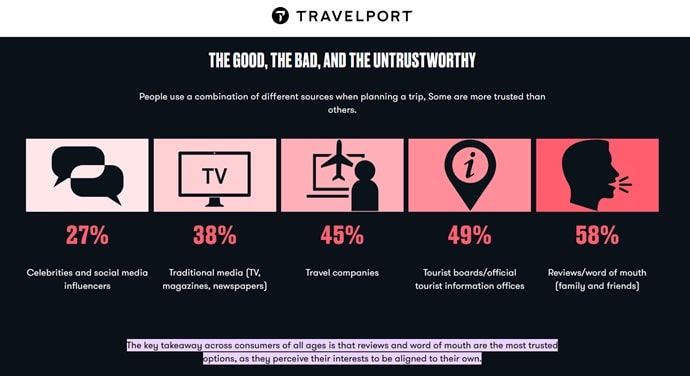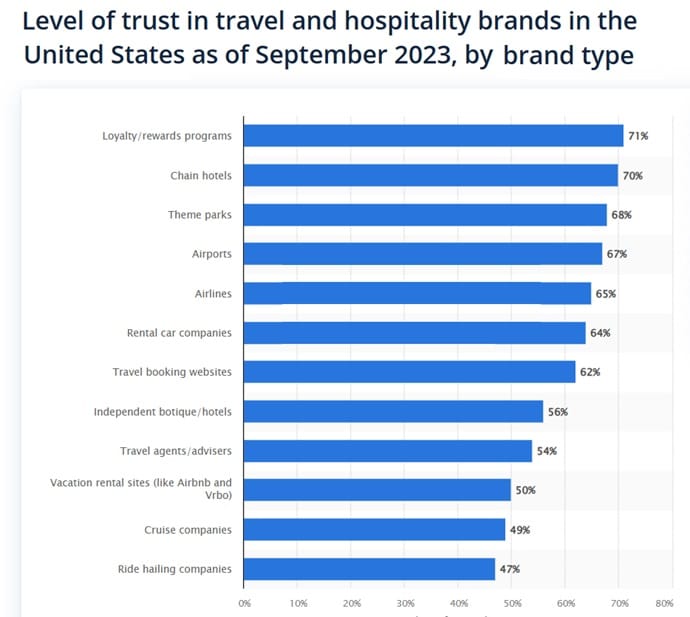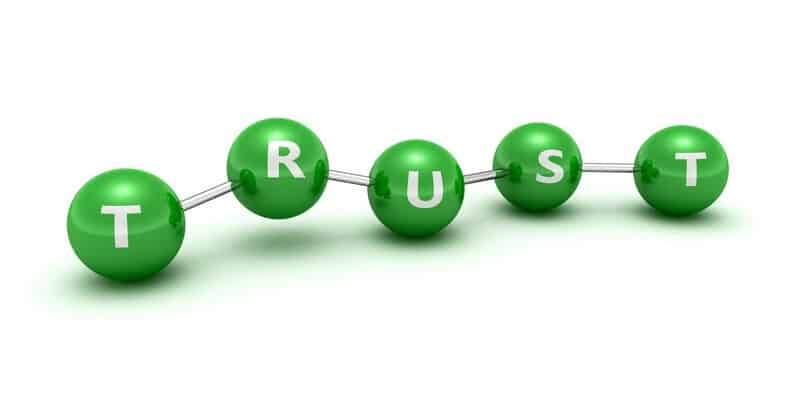Building Trust in Travel Web Marketing
Trust is a big factor in business. From job interviews to lending to word of mouth, trust is an important consideration in everything we do.
Even when travel consumers like what you offer, trustworthiness is a decision that will come into play, especially in the moment just before they click the buy button. Trust is persuasive. And the consumer’s path to purchase is paved with trust.
For any online business or brick-and-mortar enterprise today, reputation/credibility is an important part of the product that consumers are buying. Those business owners who don’t comprehend that matter of trust and how consumers decide, risk high bounce rates, abandoned shopping carts and low repeat sales. And think of the customers you fought so hard to capture, only to lose them do to a low trust rating from them. Trust is a key deliverable within your marketing mix.
For many prospects on your website (best place to convert to customers), that first minute they arrive lets them gather impressions for an important intuitive/gut instinct decision. There’s a lot of fraud and misrepresentation online and a risk of giving out cc numbers to bad people. Consumers are wary.
Trust Drives Bookings
And for many travelers, a feeling of trust may be the number one reason why they book with you. Because who wants to pay out for fake value and frustration? Your graphic style, information layout, content flow, supporting content, ad copy, blogs, emails, about us page, and more, all indicate whether you are trustworthy to travelers and purchase influencers.
People are smart. They can see the inconsistencies and overstatements that just don’t match up with their beliefs. You can’t just say you’re trustworthy, you have to prove it. It’s a project your brand manager and content creator have to work on.

Travel Pulse in its 2021 survey names Mariott, Expedia, Hiatt, Comfort Inns, Hilton, Best Western, Disney, Disneyland Resort, Southwest Airlines, and Holiday Inn as the most trusted travel brands.
What’s my instinct about why these brands are most trusted? They’re the most marketed and familiar names to most travelers so it’s a popularity vote. Hotels provide a simple service where not much can go wrong whereas an airline offers a more complex logistical product and issues happen.
This graphic from Statista reflects general levels of trust per provider category, revealing that you have one more challenge in gaining trust of consumers — your customer’s previous experiences.

Trustworthiness incorporates a lot of elements we should discuss. It’s much deeper than “consistency” or “privacy statements.” Trust is an emotional calculation and you’ll want to optimize your content to help them with their desire vs doubt struggle.
And only after you’re believable/trustworthy, will your marketing and content strategy facilitate content immersion, inquiries and bookings. The frustration you might having with your website and marketing efforts might be that visitors just don’t see why they should trust you. You have to prove it. So let’s dive into this matter now and see how content strategy et al, can help you build an image of impeccable trustworthiness and reputation.
Let’s start with these 5 indicators that come to mind with trustworthiness and credibility:
- relevance: if you’re not an appropriate serious provider of that travel service how could they trust you.
- testimonials and social proof: the words of customers ring loud if they read as credible and authentic. TravelPort found that customer reviews and word of mouth are top indicators.
- clear, concise, believable product/service descriptions: having an absence of vague pricing, travel partners, and contacts, and avoiding passive, wishy-washy wording and phrasing in your copy.
- authentic: original, real world, and engaged accounts: real, authentic, personal travel experiences and products is much more trustworthy as proof of the potential quality of experience.
- company transparency: who are the trustworthy, talented, and experienced key personnel/decision makers behind your service/product offering? — the ones to be held accountable in the case of failure?
As I discussed in a previous post on trust, trust isn’t such a simple mental and emotional calculation. Much of it involves the traveler’s gut instinct about whether all the details fit and are credible. Even one failure can communicate a serious flaw in your trust picture. For instance, you can have the perfect offering and marketing content with no transparency about you and your company which would frighten them off.
TravelPort’s survey of travelers shows another dimension of visibility, social influencers, established travel companies, tourism boards, and word-of-mouth recommendations also affect the “trust factor” of travel companies. What travelers experience before they arrive at your website or Facebook is influential.
The Many Dimensions of Trust include:
- Familiarity – are you like other travel companies they know and have trusted?
- Similar values – do you value the benefits you are selling to them?
- Relevance – is your brand relevant to their desired lifestyle and mission?
- Transparency – are your motives, people and behavior visible?
- Integrity — will you be fair and ethical in protecting their physical and financial safety? Is your return policy clear?
- Experience – do you have signficant experience/strength/skills in the travel sector they want to purchase?
- Shared experiences — are there events/activities you and your satisfied customers enjoyed available for them to review/experience/explore?
- Dependable and committed – what is your intent and do you follow through with agreements? Does your copywriting read with certainty, morality, and commitment to the customer’s satisfaction?
- Empathy — do you show you understand your target customers and have content they can relate to?
- Competence & success — people trust success because it’s proof everything worked and they’re not about to suffer the humiliation of loss — they trust your POWER. If you exhibit signs of cost-cutting, lack of advertising, and add on promos, they get the picture of weak financial strength which makes you appear risky for fulfillment.
- Visibility: Is your brand visible, promoted, and widely seen? Persistent presence builds comfort which lowers their wariness and suspicions about your intent to be a great, enabled provider.
Build and Promote Your Trusted Brand
We all know, customers buy your brand and that brand is more than just a UVP and promotional slogan. Young consumers in particular want to know more about your company’s and product’s reputation with others.
Your brand is your promise of satisfaction to the traveler. It’s more than just hitting pain points. It’s in meeting their emotional needs for a personal connection they feel in their heart — where trust is confirmed, and expectations for the greatest satisfaction are evident.
If you haven’t hired a good travel branding consultant, it is wise. The brand is the integrating influence of your entire business from content to advertising to customer service and customer loyalty. When the brand is well put together and on target, it is a massive boost for trustworthiness and credibility. All the pieces fit and that gives prospects confidence.
Overcoming Travelers Bad Experiences to Provide Reassurance
Let’s face it, there’s a lot of misleading marketing and advertising, unsubstantiated claims, and outright fraud online. And in the travel, sector being duped right before an international trip would be a horrible event. Fact is, travelers have bad experiences. Now they’re more wary.
So travel consumers are checking your travel business’s credibility and looking for what’s called social proof.
Review the Message of Trust Your Marketing Provides
It’s important to have an objective opinion about your marketing and brand and ask the tough questions about whether your company is likable and trustworthy. There’s a lot you can do to raise your trustworthiness.
And let’s not forget that even Google and Bing look at “trust factor” in their ranking algorithms. They’ll examine what you say on your website, and what’s said in social posts that link to your site, and what other websites that comment on your business and link to your site. That needs optimization too.
This is why the problem of deliberate reputation harm is an issue today. Fake bad reviews likely could damage your business in many different ways. Fake reviews are frequently published by competitors.
So before you plan to build an expensive website, roll out an advertising campaign, strategize an SEO/Content plan, or push your company via social media, incorporate massive trust into your brand and content.
Avoid using generative AI content and create, unique authentic descriptions and accounts of rich travel experiences that make your products/services look high quality and personally relevant. People pay for quality, relevance and trust.
I hope I can help you build your travel agency, destination, hotel, or tour company so that it becomes trustworthy in every possible dimension. That will make it compete with the travel conglomerates. You can win if you optimize these things.
Find out more about more about my travel marketing services. Catch up on more blogs covering hotel marketing, tour marketplaces, travel management software, and travel marketing software. Want to write great travel articles, and describe the best travel experiences and best destinations to visit?
Contact me at 416 998 6246 to chat about how I can help.

